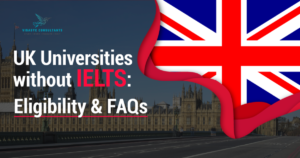Top UK Universities That Don’t Require IELTS in 2023: A Complete Guide for International Students
The United Kingdom has long been a sought-after destination for higher education. Known for its rich history, diverse culture, and high academic standards, the UK attracts students from around the globe. However, the International English Language Testing System (IELTS) often serves as a stumbling block for many aspiring students. This comprehensive guide aims to provide an alternative path by detailing UK universities that don’t require IELTS for admission.
Why Some UK Universities Don’t Require IELTS

IELTS is a globally recognized test for English language proficiency. However, it’s not the only measure of a student’s ability to communicate effectively in English. Recognizing this, some UK universities have adopted alternative methods for assessing language skills.
Alternative Methods of Assessment

Interviews: Interviews can offer a more holistic view of a student’s language skills, including comprehension, speaking, and listening abilities.
TOEFL/PTE: These standardized tests are also globally recognized and are often considered equivalent to IELTS by many universities.
Benefits of Studying in the UK Without IELTS
Opting for universities that don’t require IELTS comes with several advantages:
Cost Savings
IELTS can be a financial burden, especially for students from low-income families. The test itself can cost up to $250, not including preparation materials and courses.
Time Savings
Preparing for IELTS can be time-consuming, often requiring months of study. Without this requirement, students can focus on other crucial aspects of their application, such as essays and interviews.
Less Stress
The pressure to perform well on standardized tests can be overwhelming. By choosing a university that doesn’t require IELTS, students can avoid this stress and focus on what truly matters: their education.
List of UK Universities Without IELTS

Several prestigious universities in the UK offer programs that don’t require IELTS. Here are some of them:
University of Bristol
Courses Offered: Engineering, Business, Arts
Admission Requirements: High school diploma, TOEFL/PTE scores
University of Glasgow
Courses Offered: Medicine, Law, Science
Admission Requirements: High school diploma, Interview
University of Birmingham
Courses Offered: Computer Science, Business, Medicine
Admission Requirements: High school diploma, Interview
University of Manchester
Courses Offered: Engineering, Business, Arts
Admission Requirements: High school diploma, TOEFL/PTE scores
How to Apply

The application process for universities that don’t require IELTS is similar to those that do, with a few exceptions. Here’s how to go about it:
Research: The first step is to identify universities that offer the course you’re interested in and don’t require IELTS.
Contact the University: It’s always a good idea to reach out to the admissions office to confirm the requirements.
Submit Application: Most universities have an online application portal. Make sure to fill out all the necessary details and upload the required documents.
Interview/Alternative Tests: If the university requires an interview or another test, make sure to prepare well.
Acceptance and Visa: Once you receive your acceptance letter, the next step is to apply for a student visa.
Scholarships and Financial Aid (200 words)
Studying abroad is a significant financial undertaking. However, many universities offer scholarships and financial aid to help offset the costs. Some scholarships are merit-based, while others consider financial need. It’s crucial to research each university’s options and apply as early as possible.
Conclusion
The UK offers a plethora of educational opportunities, even for those who wish to bypass the IELTS. With proper research and preparation, you can find a university that not only meets your academic needs but also accommodates your language proficiency level. Your dream of studying in the UK could be just an application away.
FAQs

Q1: Can I work while studying?
A: Yes, most student visas allow you to work up to 20 hours a week.
Q2: What are the living costs?
A: The cost of living can vary significantly depending on the city in which you choose to study. On average, you can expect to spend between £800 and £1,200 per month.
Q3: Are there any other English proficiency tests accepted?
A: Yes, some universities also accept TOEFL, PTE, and even their own English proficiency tests as an alternative to IELTS.
Q4: How do I apply for scholarships?
A: Each university has its own scholarship application process, usually accessible through their official website. Make sure to check the eligibility criteria and deadlines.
Q5: Can I apply for a post-study work visa after graduation?
A: Yes, the UK offers a post-study work visa that allows you to work, seek employment, or start your own business for 2 years after completing your studies.
Q6: Is healthcare available for international students?
A: Yes, international students are generally eligible for free healthcare through the National Health Service (NHS) if they are enrolled in a full-time course lasting six months or more.
Q7: What is the average tuition fee for universities that don’t require IELTS?
A: Tuition fees can vary widely depending on the course and university. However, you can expect to pay anywhere from £10,000 to £38,000 per year.
ALSO READ : Exploring Alternatives How to Pay for Study Abroad Without Taking Loans
ALSO READ : “unleashing LinkedIn’s Implicit The Art of Profile SEO”




